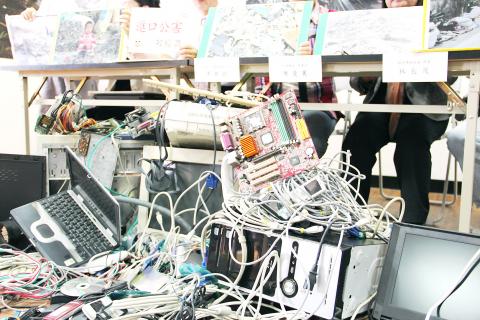Environmental activists yesterday urged the government not to exclude scrap metal, including electrical and electronics equipment, from its definition of hazardous industrial waste, as this would allow its import into Taiwan.
The Environmental Protection Administration (EPA) is considering amending the Standards for Defining Hazardous Industrial Waste (有害事業廢棄物認定標準) to exclude 12 types of scrap metal — including wires, computers, household electronics, telecom products and printed circuit boards — and redefine them as general industrial waste, which are not banned from import into the nation, environmental advocates said.
Showing photographs taken years ago of waste circuit boards and wires piled up along the banks of the Erjen River (二仁溪), with hundreds of fish lying dead on sections of the river bank, the groups said they fear that once the standards are amended, the public would see a repetition of those horrific scenes of rivers polluted by toxic chemicals across the nation.

Photo: CNA
Homemakers United Foundation president Chen Man-li (陳曼麗) said 1,800 tonnes of domestic industrial waste are created each year, and while the EPA claims a high recycling rate of 82 percent, many toxic substances, such as furnace slag ashes, remain and pollute the environment.
“Don’t we have enough domestic industrial waste to worry about?” Chen asked.
“The public is now worried about the safety of adulterated edible oil products, but the pollution from recycling these scrap metals may affect an even bigger portion of our living environment,” she said.
Tainan Community University Research and Development Association director Huang Huan-chang (黃煥彰) said since the early 1970s, the scrap metal recycling industry by the Erjen River has already caused irreversible heavy pollution to the air, water and soil, from the burning of plastic parts and pickling metal with strong liquid acid to extract precious metals.
He said that the high level of dioxins in the air and heavy metal contamination in the water and soil near the Erjen River led a Canadian researcher to define the area as “unsuitable for living” in 1983. The pollution was finally halted by the government, which spent up to NT$4.2 billion (US$142.5 million) for river remediation over the past two to three decades.
Taiwan Watch Institute director Herlin Hsieh (謝和霖) said many of the waste electronic products contain brominated flame retardant, which may release highly toxic polybrominated dibenzo-p-dioxins and dibenzofurans when burned and are endocrine disrupting chemicals that may affect the brain.
“The main objective of the Basel Convention on the Control of Transboundary Movements of Hazardous Wastes and their Disposal is to restrict transboundary movements of hazardous wastes,” Huang said.
“Taiwan is a small island that cannot afford to become a hazardous waste treatment center for other countries,” Huang said.
In response, EPA Department of Waste Management director Wu Tien-chi (吳天基) said that while the nation lacks resources, it is an electronics export-oriented economy.
To vertically integrate the industry from manufacturing to consumption to recycling, the EPA is considering allowing the import of scrap metal to aid the development of the recycling industry.
Recycling companies will be required to report their treatment process, and the remaining waste substances will be disposed of using legal facilities, he added.

Several Chinese Nationalist Party (KMT) officials including Chairman Eric Chu (朱立倫) are to be summoned for questioning and then transferred to prosecutors for holding an illegal assembly in Taipei last night, the Taipei Police said today. Chu and two others hosted an illegal assembly and are to be requested to explain their actions, the Taipei City Police Department's Zhongzheng (中正) First Precinct said, referring to a protest held after Huang Lu Chin-ju (黃呂錦茹), KMT Taipei's chapter director, and several other KMT staffers were questioned for alleged signature forgery in recall petitions against Democratic Progressive Party (DPP) legislators. Taipei prosecutors had filed

Taiwan would welcome the return of Honduras as a diplomatic ally if its next president decides to make such a move, Minister of Foreign Affairs Lin Chia-lung (林佳龍) said yesterday. “Of course, we would welcome Honduras if they want to restore diplomatic ties with Taiwan after their elections,” Lin said at a meeting of the legislature’s Foreign Affairs and National Defense Committee, when asked to comment on statements made by two of the three Honduran presidential candidates during the presidential campaign in the Central American country. Taiwan is paying close attention to the region as a whole in the wake of a

NEW WORLD: Taiwan is pursuing innovative approaches to international relations through economics, trade and values-based diplomacy, the foreign minister said Taiwan would implement a “three-chain strategy” that promotes democratic values in response to US tariffs, Minister of Foreign Affairs Lin Chia-lung (林佳龍) said. Taiwan would aim to create a “global democratic value chain,” seek to capitalize on its position within the first island chain and promote a “non-red supply chain,” Lin was quoted as saying in the ministry’s written report to the Legislative Yuan submitted ahead of the legislature’s Foreign Affairs and National Defense Committee meeting slated for today. The Ministry would also uphold a spirit of mutual beneficial collaboration, maintaining close communication and consultations with Washington to show that Taiwan-US cooperation

Taiwan and the US have begun trade negotiations over tariffs imposed by US President Donald Trump earlier this month, Minister of Foreign Affairs Lin Chia-lung (林佳龍) said in an interview this morning before reporting to the Legislative Yuan’s Foreign Affairs and National Defense Committee. The Taipei Economic and Cultural Representative Office (TECRO), Taiwan’s de facto embassy in the US, has already established communication channels with the US Department of State and the US Trade Representative (USTR), and is engaging in intensive consultations, he said. Points of negotiation include tariffs, non-tariff trade barriers and issues related to investment, procurement and export controls, he